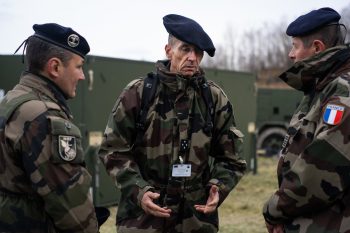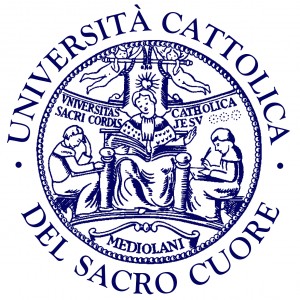
 March 11, 2010 • Analysis •
March 11, 2010 • Analysis •
 Speech of Jean-Sylvestre Mongrenier, Research Fellow at the Thomas More Institute and author of La Russie menace-t-elle l’Occident ? (Choiseul, 2009), during the Round Table « Afghanistan e oltre: La NATO verso un nuovo Concetto Strategico », organized by the Catholic University of Milano on March 10th and 11th, 2010.
Speech of Jean-Sylvestre Mongrenier, Research Fellow at the Thomas More Institute and author of La Russie menace-t-elle l’Occident ? (Choiseul, 2009), during the Round Table « Afghanistan e oltre: La NATO verso un nuovo Concetto Strategico », organized by the Catholic University of Milano on March 10th and 11th, 2010.
First, I would like to thank Mr Massimo de Leonardis and the Universita Cattolica del Sacro Cuore for their invitation. It is really a great honour to take the floor in this location. I have to speak about France and NATO with the prospect of a strategic concept at the end of 2010, at the Lisbon Summit. The topic of this paper is the following: How does France look at the future of NATO after returning to the integrated military structures? In fact, there is little active public debate about this issue in France and it requires an examination of History, the geopolitical representations of French rulers, diplomatic plans and political choices in order to understand the French perception of NATO and its future.
My first point will be about the coming back of France into the NATO military structure and its reasons; it may help us to approach the French perception and interests in that matter. My second point will be focused on the official French line about NATO: which NATO, for which role and which missions? Then, in my third point, I shall approach the significance and the limits (the posture, perhaps) of the French rhetoric about NATO and its real place in its policy.
France’s return to NATO’s military structure
This decision has long been expected and it was reached at the Strasbourg-Kehl Summit, in April 2009, where a new strategic concept was announced. The ins and outs of this matter could help us to better understand French ideas about NATO and it requires a short historical perspective. One of Paris’s diplomatic priorities in the aftermath of the Second World War was to place France as the main power in Western Europe.
In order to face the Soviet threat, the Quai d’Orsay (i.e. French diplomacy) worked in the direction of an Atlantic alliance and when this pact was set up, the French authorities wanted their country to be recognised as the third major nation within NATO, together with the US and the UK, but France’s means allocated to NATO were not enough to live up to national ambitions and its allies were not ready to give France a specific status.
So France was increasingly frustrated – remember the Suez crisis (1956) – and De Gaulle’s return to office finally led us to withdraw from NATO’s military structure (this is, of course, a very succinct summary). In short, France failed to place itself as the head power in Western Europe and to take the lead among the European allies and in the European Community. Therefore, a national approach was preferred with nuclear forces and France obtained a specific status but only by being apart from the other European allies and not ahead of them. On each side, this decision had a heavy cost: NATO was in a shambles, France was cast aside from the internal political circuit and its influence decreased within the Alliance.
In the aftermath of this decision, Paris had to heal the rift with NATO. In the seventies, military and logistic agreements were signed and in the eighties, the French battle corps was asked to play a growing role in Centre- Europe theatre. In the nineties, at the end of the Cold War, new challenges colluded to increase French participation into NATO’s military structures. So, we can observe that France’s full participation in NATO is the banner of a long-running evolution instead of a strategic rupture and this decision had been maturing since the mid of the nineties.
What was at stake according to the public arguments and statements of French high-ranked officers and rulers? It was to increase France’s “return on equity” in terms of its influence within NATO (on NATO policy) and concerning the European military issues in order to remain a major military nation like the UK (with a discreet competition between Paris and London): a leading nation able to command and control a multinational operation within NATO or UE frameworks (see the French participation in the NATO Response Force at the Prague Summit, in November 2002). It was also to consolidate and to preserve NATO from excessive globalisation and at the same time to open new fields for a hypothetical “European defence”.
With this first approach, it seems that NATO is a means for national goals rather than for European and Western goals: the weight of France in NATO and its military capabilities are in the balance more than public welfare of the Alliance. One remark however: when the French president explained his choice – coming back to the military structure – he referred to the Western family (two or three times). This fact was stigmatised by some commentators and it is no longer the same now.
Wich NATO for wich role and which missions? The French prospect regarding the Alliance
It has been said that the French leaders explained the return to NATO military structures by the will to preserve and consolidate the Alliance. What does it mean about the French perception of the current and future NATO?
Despite the long-running evolution of NATO towards a community of security (i.e. more than a mere alliance), a globally responsible NATO able to rise up to outside challenges with civilian means (I am thinking of Afghanistan). NATO would have to remain a political and military alliance centred on article 5 i.e. defensive missions. In such a perspective, NATO would not need to develop a comprehensive approach with a very few exceptions and the exception should not turn into a rule. In fact, the idea would be to preserve the future of the European Union and its hypothetically growing role in International affairs (officially at least).
In opposition to the American project of a “global NATO” – with global partners and global commitments on far off geopolitical theatres – French officials do insist on the importance of a historical, geographical and cultural background for the Alliance’s solidity and cohesion. In short, it would be a Euro-atlantic Alliance and not a “global NATO”. In private, some French officials like to say that NATO is not a “couteau Suisse” i.e. a Swiss army knife (with many blades, tools and various options) and they mock the pseudo-project of “NATO of democracies”. These themes are almost a byword within the French diplomatic and military Establishment.
At last and with a long term perspective, NATO as such would have to be subordinate to a new transatlantic Alliance between an American pillar and a European pillar: the US and the European Union. In such a perspective, Canada is forgotten even if this is certainly a major mistake; let us bear in mind the Arctic theatre.
Firstly, France would have clarified its position towards NATO by giving up its “exception” and stopping championing the US and the Alliance. So, it would have sufficiently reassured its allies regarding the project of European defence: France and its European partners could go ahead in that field. Afterwards, the defence of the Euro-Atlantic ensemble would depend on a renewed alliance between the US and a European Union turned into a “Europe-power”.
In that scheme, NATO structures would be used above all only to produce technical standards, military interoperability and strategic know-how. It would no longer be a political body with decisional capabilities and the transatlantic policy-making would be processed into a new and specific structure between the US and the European Union. It has to be specified that this perspective is not yet a real diplomatic plan but a sort of regulatory idea for the future of security in the Euro-Atlantic ensemble. It is a very constructivist mindset which can lead us to scepticism but it has to be taken into account in order to define the French geopolitical representations and their consequences and fallout for the view about NATO’s future even if this regulatory idea may already be an idea of the past!
Signifiance and limits of the French perspective
We could say that there are some contradictions and perhaps some pretence in the French rhetoric about NATO (and also about the European Union). First, there is a contradiction between the prospect of a mainly military “regional NATO” on the one hand, the challenges which have to be met in Afghanistan (or elsewhere) on the other hand. However, French armies are engaged in this theatre and therefore can not ignore the situation and the counter-insurrection requisites; progressively French officials have had to admit that threats had to be taken into account and responded to far away from our borders. However, it seems that France’s increased engagement announced in April 2008 at the Bucharest Summit was above all a goodwill gesture towards the US. So, this engagement could be more of a diplomatic position than a clear perception of the security stakes (we know that almost nothing has been done in terms of reinforcements since the American push).
The question is to know whether France and the Allies could claim to maintain NATO as a strong and effective Alliance – not a residual structure – without taking into account the outside World (the “out of area” in the NATO language) and facing various far off threats. Threats are not only regional but global and global security requires a comprehensive approach with civilian capabilities. In order to do that, NATO and the American driving force will be necessary. So, we shall have to find a balance between regional security and global security; both are within the scope of NATO.
Secondly, there is another contradiction –or at least a gap – between saying that regional security must prevail on the one hand and denying any risk or threat Eastwards on the other hand. Of course, I have in mind the French will to develop a “special partnership” with Russia and even sell several amphibious and assault ships to it (the “Mistral”). It is not consistent to insist on “Old NATO”, collective defence or even the Treaty of Lisbon in a European framework (with its security clauses) and contribute indirectly to endangering the security of allies and partners in the Baltic and Black Sea … At times, I recall Bismarck: “Who says Europe is lying”.
In fact, it looks as if French leaders had first and foremost a national approach of NATO and European security rather than the will to work for the public welfare of the Euro-Atlantic ensemble. NATO would be still valid as a form of insurance against heavy risks and threats considered as unlikely (wrongly, perhaps) and for major diplomatic matters like the Iranian nuclear crisis, the objective would be to enhance bilateral relations with the US and some other major powers, outside a formal Atlantic framework (a sort of ad hoc coalition).
Moreover, I am not sure that the “European defence” is always a top priority in France’s political agenda. The European Union is a Pan-European commonwealth rather than a virtual Commonwill and there is neither a hegemonic actor to bring together energies, wishes and capabilities nor a hard core able to be a driving force within it. There is even a sort of muted competition between France and Germany for a form of quiet leadership in Europe and partnership with Russia.
In fact, the French “grand strategy” consists in leaning back against US and the transatlantic relations in order to face the possible main threats and to stabilize Europe. At the same time, French rulers are trying to develop several partnerships with other powers and key-countries worldwide: Russia in the Eurasian hinterland (more for national reasons than the NATO “reset” policy); Egypt in the Middle-East through the Union for the Mediterranean; Qatar and Abu-Dhabi in the Gulf; Brazil in South America and so on …
The guideline is to preserve a status of “puissance moyenne à vocation mondiale” i.e. a medium power with a global vocation. The French dream would be to stand at the intersection of three circles: the Euro-Atlantic ensemble, the Euro-Siberian ensemble and the Euro-Mediterranean ensemble. Of course, it is improbable that France could play such a geopolitical game – let us consider the state of affairs in the Union for the Mediterranean – but the French perception of NATO can not really be understood without that global geopolitical representation.
To conclude…
I would say that I am not sure that such a geopolitical representation and its consequences in France’s politico-military choices are the best for the cohesion, the strength and the transformation of NATO. I even fear that French leaders do not yet have a global and dynamic vision of NATO’s future able to turn their country into a prospective power capable of playing a major role in NATO’s Transformation. Despite the return to military structures and the proclaimed will to exercise authority and influence, mindsets are still fixed on “Old Europe”, past-games and stereotypes.
Lastly, I would like to stress the importance of NATO and the transatlantic relations for Europe. No-one could imagine what would happen if the Euro-Atlantic institutions collapsed because of national self-help but the “European Europe” as De Gaulle called it would certainly be far removed from the European dream.
